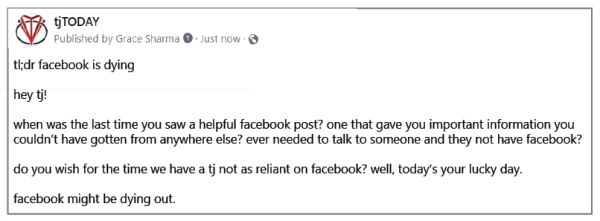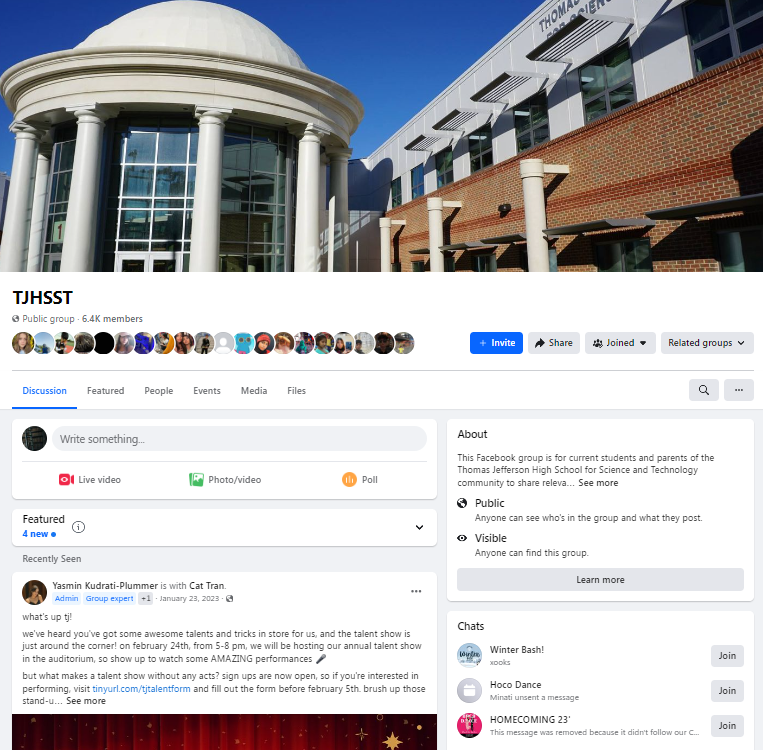tl;dr facebook is dying
hey tj!
when’s the last time you saw a facebook post? one that gave you genuinely helpful information you used in your daily life? when was the last time you found out about an important event from just facebook, and not through any other sources?
what about reaching out to classmates? have you ever had to talk to someone and realize they don’t have facebook?
do you wish for the time we have a tj not as reliant on facebook? well, today’s your lucky day. facebook might be dying out.

Stating the facts
“If you don’t have Facebook, you don’t know when [clubs] are selling stuff, you don’t know when clubs have events, you don’t know all these sorts of really important stuff,” junior Namirah Ahmad said. “I got it Facebook in the beginning of ninth grade because I heard from other people that it’s important if you go to [Jefferson].”
During the pandemic, Facebook groups offered ways for students to connect with one another. One specific group, Jefferson Chefs, was a community where students shared pictures of recent foods and desserts they made.
“Jeff Chefs was a way [to connect with others] for me, at least, because it was during COVID and I couldn’t see anyone,” senior Ellen Zeng said. “There’s less of a need for Facebook groups that you join and interact with now that we are in person and back to normal.”
However, in recent months, participation in groups such as Jefferson Chefs has noticeably decreased, especially amongst underclassmen.
“It’s a dead group because right now it’s just the graduated upperclassmen and seniors,” Zeng said. “We didn’t spend as much time growing the group and get to the underclassmen. That’s what the first admins did.”
Facing the facts
“People are posting on Facebook more than they are looking at Facebook,” senior Student Government Association (SGA) president Yasmin Kudrati-Plummer said. “We see more posts from people who just go to Facebook to post than we see people who are going to Facebook to scroll. People stopped using it because everyone was posting all the time, meaning you’re trying to find one thing and then you’re flooded by 100 posts.”
However, other students, such as Ahmad disagree, citing the main Facebook group, “TJHSST,” as the perfect amount of posts and updates daily.
“I don’t think there is excessive news postings on Facebook,” Ahmad said. “I feel like they have the right amount of information that will get people interested. Whenever I check the main group I just see bake sales or special events happening.”
Jefferson’s reliance on Facebook, as well as other social media platforms such as Instagram, prevents students such as freshman Mahrukh Kiyani, who does not have a phone, from keeping in touch with school events.
“One, it’s a privacy issue, and two, I’ve read the news and [heard] how companies are using private information. I didn’t want that to happen to me,” Kiyani said. “I don’t know what’s going on because everything is on Facebook and I [don’t use] it. I hardly know any events, like what’s happening [or] where is it happening, and I have to rely on my friends for that.”
All in all, many students agree that change is needed, whether that be in the form of moving to another social media platform or another method entirely. Moderators of once-popular Facebook groups not officially affiliated with Jefferson, such as Jefferson Chefs, also see a decreasing need for the community it provided.
“Facebook was popular pre-COVID but now people are using Instagram or other platforms to advertise information about their clubs or events,” Zeng said. “While the Jeff Chef’s community was great at the time when it was popular, it’s not as necessary anymore. People are just transferring, it’s just a change. It’s not bad or good, it’s just different.”
Future prospects
“[SGA] has started to already implement our own changes,” Kudrati-Plummer said. “We’ve made an Instagram group to replace the Facebook group for advertising and we limited advertising on the Facebook group itself because something that I’ve heard from a lot of different people was that Facebook was becoming overwhelming.”
Instagram, a social media platform popular amongst teenagers, is a common alternative to Facebook often proposed by students. The platform provides a different type of post compared to Facebook, though, which has both benefits and drawbacks.
“The one really nice thing [about Instagram] is it allows people to post as themselves. It would be one body posting for everybody,” Kudrati-Plummer said. “Facebook makes it possible for people to share their ideas in a really easy manner, especially text posts, which Instagram doesn’t offer. It’s always a graphic with text. That’s probably the biggest drawback is that you can’t do text posts and people are less willing to read a caption for an Instagram post as they will be to read the actual post on a Facebook group.”
That being said, Facebook groups provide a greater sense of community due to its “Facebook group” option, which allows students and parents alike to connect with others in their year.
“Just how the platform app works, it was easier to join a big group and like feel a part of it because one of the main things about Facebook is if you’re in a group, everyone can post,” Zeng said. “On Instagram, one or two people are running an account that other people follow.”
To accommodate students without phones, Ahmad proposes having announcements move toward TJ Intranet (Ion), Jefferson’s online platform to sign up for eighth-period activities, see bus locations at the end of the day, year-long events, and school-wide announcements. While announcements are currently available on Ion, they tend to be limited to school-wide announcements and are not often read by students. Ahmad proposes Ion have a section for smaller club or class announcements for students who do not use social media.
“On Ion, we could have specific sections for different types of announcements so it wouldn’t get cluttered. There could be a tab where on the left there are club announcements, or school-wide announcements, or specific grades,” Ahmad said. “On the left side of Ion you can [see] different blocks. Maybe they could add a new tab where all the club announcements can be posted.”
However, some students, such as Zeng, do not see Facebook completely waning out.
“Being able to join a group and have everyone able to post is something unique to Facebook. I think people will just use it less than they did before. But it’ll still be around for us,” Zeng said. “I feel like it’s still good for you to have [coming into TJ].”
In addition to the groups, Facebook provides access to a widely used communication app across the school: Messenger. With almost everyone present on Messenger, group chats across grade levels or classes, such as all students taking TJ Math 4 or in a certain Humanities (HUM) rotation, help students communicate and study alongside one another.
“I think Messenger won’t be cut [because] it’s an easy way to connect everybody,” Kudrati-Plummer said. “Instagram has limits to the number of people in chat and it’s harder to add people to them.”
Regardless of what platform or to what degree Jefferson moves away from Facebook, most students agree that the change is necessary.
“It’s time we start to say goodbye. A lot of the incoming classes are less and less using Facebook as a means of communication [than seniors] used it in our freshman year,” Kudrati-Plummer said. “Now that we’re out of COVID times we don’t need it as much.”
A shorter version of this article appeared in the February 2024 Print Issue of tjTODAY


